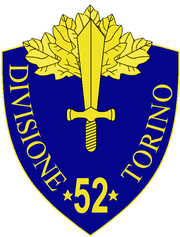52nd Infantry Division Torino
The 52nd Infantry Division Torino was an auto-transportable infantry division of the Italian Army during World War II.[nb 1] The division was formed from the expansion of the Torino Brigade in June 1940. It took part in the Invasion of Yugoslavia and was then sent to the Eastern front as part of the Italian Expeditionary Corps in Russia ( Corpo di Spedizione Italiano in Russia).
| 52nd Infantry Division Torino | |
|---|---|
 52nd Infantry Division Torino Insignia | |
| Active | 1940–1943 |
| Country | |
| Branch | |
| Role | Infantry |
| Size | Division |
| Nickname(s) | Torino |
| Engagements | World War II |
| Commanders | |
| Notable commanders | Ugo de Carolis |
| Insignia | |
| Identification symbol | |
| Identification symbol | Torino Division collar insignia |
Eastern Front
The Division was only auto-transportable at this time which meant in practice was that an assortment of commercial vehicles with company logos intact were pressed into service.[1] They arrived in southern Russia between July and August 1941, and were initially subordinated to the 11th Army.[2] On 14 August 1941, they were then transferred to the control of the Tank Group 1. Between 27 and 30 September 1941, the Division participated in the battle of Petrikowka. On 25 October 1941, Tank Group 1 was re designated as the 1st Panzer Army. Between 20 October and 2 November 1941, they were used in the assault on the city of Stalino (now Donetsk), an important steel center in Eastern Ukraine, and in occupying the neighbouring towns of Gorlowka and Rykovo, at the time also named Ordzhonikidze today Yenakiieve. The commander of the Torino, General Ugo de Carolis was killed in December and was posthumously awarded the Knight's Cross by the Germans.[3] The Torino remained under control of 1st Panzer until 3 June 1942 when it was subordinated to 17th Army. In July 1942 they came under control of the 8th Italian Army a new force of ten Italian divisions, which formed the left flank of the German 6th Army during the Battle of Stalingrad. It suffered heavy losses in the Soviet offensive during the winter of 1942/43 and was destroyed in March 1943.[1] Some 8,000 men of the Division were killed or missing in Russia, including 2,814 of the 51st Infantry Regiment, 2,608 of the 52nd Infantry Regiment, 1,283 of the 52nd Artillery Regiment, 483 of the 26th Mortar Battalion, 208 of the 52nd Mortar Battalion, 154 of the 52nd Transmission Company, 114 of the 171st Anti-Tank Company, and 102 of the 52nd Medical Section.[4]
The surviving members, about 1,600, returned to Italy and were disbanded in September 1943.[1]
Order of battle
- 81st Infantry Regiment "Torino"
- 82nd Infantry Regiment "Torino"
- 52nd Artillery Regiment "Torino"
- Anti-Aircraft Battalion
- 26th Mortar Battalion
- 52nd Mortar Battalion
- 52nd Anti-Tank Company
- 171st Anti-Tank Company
- 52nd Engineer Battalion
- 52nd Medical Section
- 56th Motor Transport Section
- 52nd Gasoline Supply Section
- 66th Carabinieri Section[1][nb 2]
See also
- Ugo de Carolis, recipient of the German Knight's Cross of the Iron Cross
- Italian participation in the Eastern Front
- Italian Army in Russia
Notes
Footnotes
- The division never had the required amount of Motor Transport to move all its units at the same time and is referred to as a "Auto-transportable Division"
- An Italian Infantry Division normally consisted of two Infantry Regiments (three Battalions each), an Artillery Regiment, a Mortar Battalion (two companies), an Anti Tank Company, a Blackshirt Legion (Regiment of two Battalions). Each Division had only about 7,000 men, The Infantry and Artillery Regiments contained 1,650 men, the Blackshirt Legion 1,200, each company 150 men.[5]
Citations
- Wendal, Marcus. "Italian Army". Axis History. Retrieved 11 April 2009.
- Messe, 1947. Faldella, 1959. Mack Smith, 1979
- Operation Barbarossa: The German Invasion of Soviet Russia, Robert Kirchubel, p. 86, Osprey Publishing, 2013
- https://www.unirr.it/?option=com_fabrik&view=list&resetfilters=1&listid=20&limitstart20=0
- Paoletti, p 170
References
- Paoletti, Ciro (2008). A Military History of Italy. Greenwood Publishing Group. ISBN 0-275-98505-9.